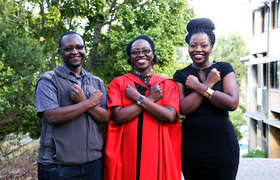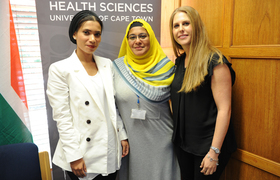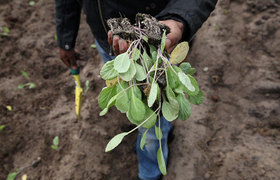Emphasising the IP gender gap
26 April 2018 | Story Charlene Musiza and Desmond Oriakhogba. Photo Nick Youngson. Read time 8 min.
Commemorating World Intellectual Property (IP) Day, UCT not only joins the global community to acknowledge the key roles women play in research, innovation and creativity, but also takes the opportunity to examine gender bias within the IP system.
World IP Day takes place annually on 26 April to promote awareness of IP rights. It is an initiative of the World Intellectual Property Organization (WIPO), which is a self-funding agency of the United Nations and a global forum for intellectual property services, policy, information and cooperation.
The theme for 2018 is Powering change: Women in innovation and creativity, to celebrate “the brilliance, ingenuity, curiosity and courage of the women who are driving change in our world and shaping our common future”.
According to Charlene Musiza, a PhD candidate in UCT’s Department of Commercial Law, and Desmond Oriakhogba, a PhD candidate and research assistant in the university’s IP Unit (which is domiciled in the law faculty), this serves as an opportunity to mark the successes of the many women researchers leading and contributing to innovation and creativity at UCT.
Work on the go
In addition, the 2018 World IP Day theme coincides with research currently underway at the IP Unit through the Open African Innovation Research (Open AIR) network. According to Musiza and Oriakhogba, Open AIR is looking for solutions to two overarching questions:
- How can open collaborative innovation help businesses up-scale and seize the new opportunities in a global knowledge economy?
- Which IP policies will ensure the social and economic benefits of innovation are shared inclusively?
“Open AIR strives to answer these questions through evidence-based research structured on the pillars of its key themes of informal sector innovation, high technology, indigenous and local entrepreneurs, and metrics, law and policy,” say the researchers. “While the research is of global relevance, its primary focus is Africa and the lessons to be learnt from African innovation by the rest of the world. And crucially, it seeks to answer questions increasingly through the lens of gender equality and empowerment of women and girls.”
Highlighting the gender gap
Musiza and Oriakhogba believe that the theme of this year’s World IP Day serves a further important purpose – it underscores the gender gap that exists in the IP system, which rewards and incentivises creativity and innovation that meets certain requirements. The problem, they say, is not that women are not innovative and creative, but that they are not taking full advantage of the IP system.
“The problem is not that women are not innovative and creative, but that they are not taking full advantage of the IP system.”
“It is common knowledge that women have made their mark in the fields of science, technology, engineering, business, mathematics, fashion, arts, music and films, among others,” say the researchers. “However, women do not seem to utilise IP systems as well as their male counterparts despite their innovative and creative exploits.”
A recent roundtable of experts at WIPO found that while the reasons for the shortfall of female participation in the IP system are various, they fit in two primary categories: general gender inequality and issues relating specifically to the IP system.
In terms of general gender inequality, the WIPO panel found the fact that far fewer girls than boys study scientific, technical, engineering and medical subjects, and also face prejudices, preconceptions and stereotypes, means that women’s potential to become leaders can be limited.
This is exacerbated by “inflexible economic and social structures, which can restrict women’s career prospects”, thereby curbing their use of IP systems.
Alienating system
The IP system itself poses barriers to women because developing some types of IP, particularly patents, can be costly.
According the WIPO panel, “women prioritise the stability of their family income, making them more risk averse than men”. That’s not all. Critique of the IP system from a feminist perspective argues that certain elements of IP law “may embed bias against women”, promoting masculine concepts of authorship, ownership and individualism.
“These concepts are alien to and not in sync with most of the creative and innovative endeavours of women and women’s work, which is undertaken in open and collaborative communities and often out of the need to burn-out the rigours of domestic life and without the need to claim authorship and/or ownership,” say Musiza and Oriakhogba.
“Such works include food recipes, basket weaving, bead making, quilting and knitting. The works do not fit into the global IP system since they may not always meet the strict requirements for IP rights already highlighted above. It is even worse when these works are informed and shaped by traditional knowledge because traditional knowledge, which exhibits creativity and innovation, does not yet enjoy adequate protection under the global IP systems and is often not considered IP.”
Closing the gap and more
The challenge is therefore not limited to finding ways of closing the gender gap, but also demands that women’s creativity and innovation are recognised and valued, say the UCT researchers.
Where this manifests in indigenous and local businesses, issues of concern are how to up-scale and take advantage of new opportunities, and how to shape IP policies to ensure that women receive an even-handed share of the social and economic benefits of innovation and creativity. This, add Musiza and Oriakhogba, requires understanding the barriers to female participation in socio-economic life.
World IP Day and the WIPO’s recent acknowledgement regarding the skewed nature of participation in the IP system provide a good opportunity to highlight how important it is for institutions – government, academia and industry – to not only improve efforts towards female empowerment, but also to proactively facilitate female participation in the IP system.
“It is imperative to remove social, economic and political barriers and create an environment that not only allows female creativity and innovation to thrive, but also equally recognises and values female creativity and innovation,” conclude Musiza and Oriakhogba.
 This work is licensed under a Creative Commons Attribution-NoDerivatives 4.0 International License.
This work is licensed under a Creative Commons Attribution-NoDerivatives 4.0 International License.
Please view the republishing articles page for more information.










